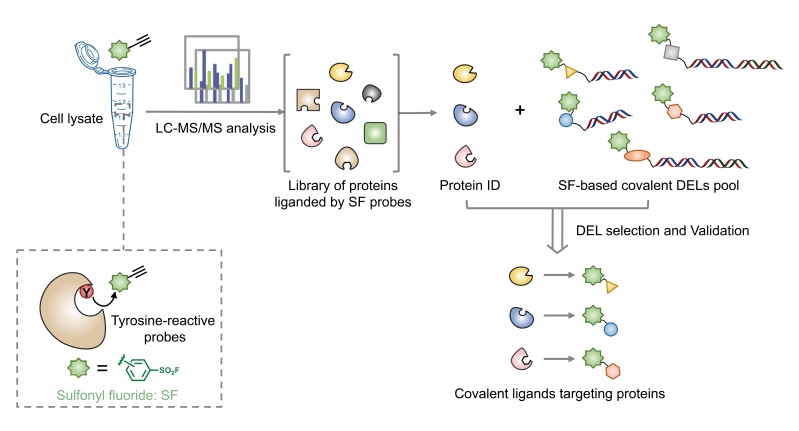
The DNA-encoded chemical library (DEL) has emerged as a powerful technology for rapidly synthesizing and selecting library members. DELs incorporating an electrophile warhead, known as covalent DELs, have been utilized for covalent drug discovery. However, the use of these covalent DELs has been limited to targeting cysteine, primarily due to the poor diversity of warheads used, such as acrylamide, acrylate, ketone, epoxide, and boronic acid. Therefore, the development of covalent DELs with non-cysteine-targeting warheads would expand the utility of DELs for the discovery of novel covalent inhibitors.
Recently, Prof. Lu Zhou's group of School of Pharmacy, Fudan University, collaborating with Prof. Xiaojie Lu's group and Prof. Minjia Tan's group of Shanghai Institute of Materia Medica, Chinese Academy of Sciences, developed a screening platform for tyrosine-targeting covalent ligands by integrating sulfonylfluoride-based DEL enrichment with activity-based proteome profiling as a guide. This work was published online in the Journal of the American Chemical Society entitled as ABPP-CoDEL: Activity-Based Proteome Profiling-Guided Discovery of Tyrosine-Targeting Covalent Inhibitors from DNA-Encoded Libraries.

Through analyzing the reactivity of sulfonyl fluoride electrophiles in proteomes, the researchers chose three appropriate targets (phosphoglycerate mutase 1, glutathione s-transferase 1 and dipeptidyl peptidase 3) as models for sulfonyl-fluoride DEL selection. Through the screening of a vast DELs pool containing 67 million compounds, novel covalent ligands that selectively targeted tyrosine residues were identified. This demonstration highlights the potential of sulfonyl fluoride as a promising warhead for tyrosine-targeting covalent ligands and the importance of combining activity-based proteome profiling and covalent DEL enrichment (ABPP-CoDEL) in the rapid discovery of covalent inhibitors.

Lulu Jiang, a Ph.D. student of School of Pharmacy, Fudan University, Sixiu Liu, and Xinlong Jia, are the co-first authors of the paper. Prof. Minjia Tan and Prof. Xiaojie Lu from Shanghai Institute of Materia Medica, Chinese Academy of Sciences and Prof. Lu Zhou from School of Pharmacy, Fudan University, are the corresponding authors of the paper. The work has been funded by National Natural Science Foundation of China and Shanghai Municipal Committee of Science and Technology.
The original link: https://doi.org/10.1021/jacs.3c08852